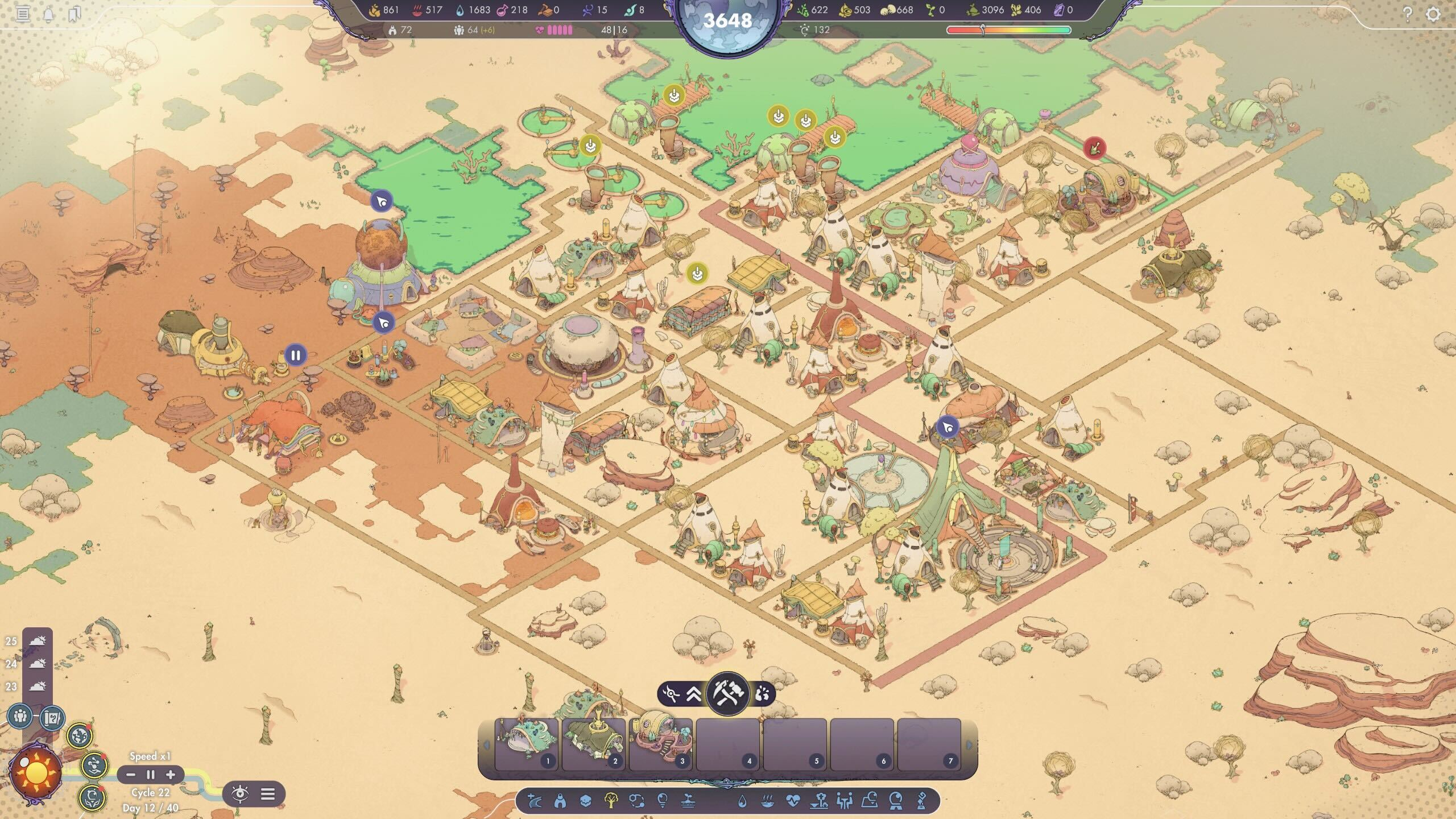Synergy's solarpunk aesthetic and harsh resource management makes it one stellar city builder
Like a fish out of water.
After listening to the calm desert breeze alongside the whispers of woodwind and string instruments for the better part of a day, it can be easy to forget just how difficult and deadly the city-building and management game Synergy really is. And despite my rocky start with it, I soon realised that brute force wasn't going to cut it in this arid land.
If, like me, you also played the demo, you'll be pleased to know that Synergy's early access adds many more buildings, vegetation, exploration, and decorations. I was surprised to see just how big the research trees had become, with eight branches and around 60 different aspects to research, including new buildings, ways to irrigate and grow plants, and, of course, benches and lights to make your city look pretty. But more stuff doesn't mean everything's easier now. If anything, the increased amount of buildings and research makes looking after your citizens even more tricky, as you have to spin multiple plates at once to ensure everything works like clockwork.
Starting off with a simple storage hut with some basic necessities like food, water, and building materials, the few refugees that are under your care are exhausted from fleeing from their collapsed civilization and are starting to bake under the desert sun. After setting up camp next to a pool of dirty water, you need to act quickly to extract and clean it as well as make some shelter for your population so they don't all die of heat stroke.
I've recently been playing another city-building game, Manor Lords, so I'm used to building a lot of houses, deforesting the land, and giving everyone chickens so they can become self-sufficient. My goal has always been to develop and manage the biggest city I possibly can, but then the dry season came.
Synergy has a couple of different weather conditions. Instead of your usual four seasons, the planet you're on fluctuates between temperate and dry periods. In temperate seasons, more food grows, and your citizens are less likely to get sick working under the sun. I've found that this is the best time to harvest as many materials as possible and build infrastructure, because once the dry season comes, you won't want to do anything.
In my first playthrough, I messed up royally during the dry season. I underestimated the strain it would put on my population and what the lack of preparation would do to my city. Several civilians died of hunger and illness, and it was incredibly difficult to get on my feet and make a solid start afterwards, since I spent a lot of time playing catch-up, desperately picking berries, and building hospitals. I misjudged Synergy for its pastel pallet and peaceful music, thinking it would be a walk in the park and be as pleasant as it looked. This solarpunk world is just as harsh and complex as any tough city builder, and definitely doesn't hold back its punches.

In time I learnt that one of the best ways to prepare for a dry season is to check how many units of food or meals your population gets per cycle, then stockpile that plus extra for a (non)rainy day. This will also come in handy if you're so unlucky as to deal with more than one dry season in a row.
Once I realised how important living off the land was, my second playthrough was a lot easier. While balancing resource extraction and environmental preservation was tricky at first, it soon became second nature. Now, I don't have to worry about all my settlers starving at the first sniff of a dry season, and I can focus on rebuilding my civilization, and the ecosystem alongside it. Working on seed farms and compost stations to improve the local soil or building bird nests that can encourage wildlife to return to the desert are all worthwhile endeavours. Ever so slowly, patches of grass began to spread through the desert and my small town.
I love solarpunk ideals, which encourage renewable energy, working with nature, and refusing pessimism in the face of hardship. The fact that you're not just trying to keep your citizens alive, but also the planet that they live on, gave me the right kind of motivation to persevere—despite all my mistakes taking the form of a pile of corpses which, at one point, didn't seem like it would stop growing. So, if you ever find yourself sitting on a load of dead bodies after a particularly harsh dry season, pick some fruit and keep a sunny disposition—because, like it or not, you're this planet's last hope.
